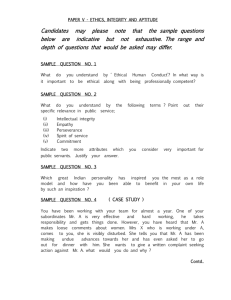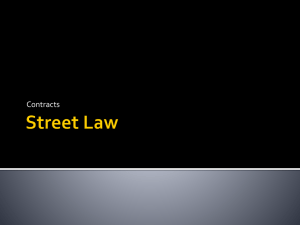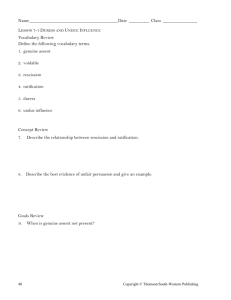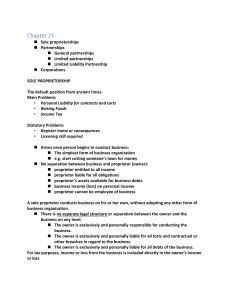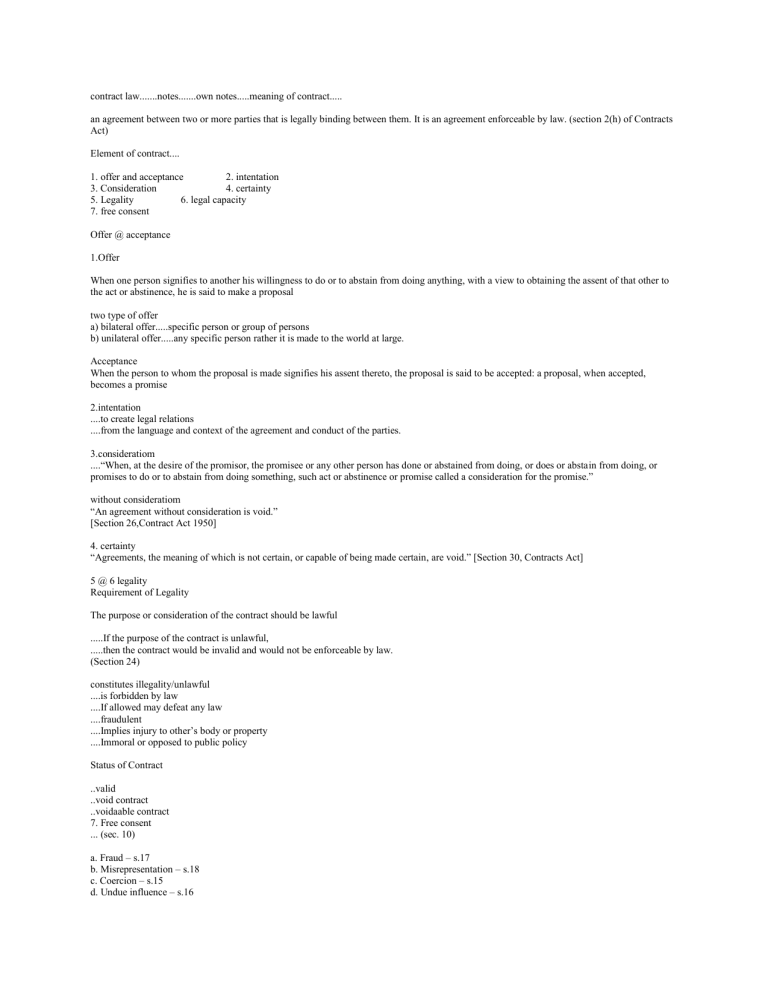
contract law.......notes.......own notes.....meaning of contract..... an agreement between two or more parties that is legally binding between them. It is an agreement enforceable by law. (section 2(h) of Contracts Act) Element of contract.... 1. offer and acceptance 2. intentation 3. Consideration 4. certainty 5. Legality 6. legal capacity 7. free consent Offer @ acceptance 1.Offer When one person signifies to another his willingness to do or to abstain from doing anything, with a view to obtaining the assent of that other to the act or abstinence, he is said to make a proposal two type of offer a) bilateral offer.....specific person or group of persons b) unilateral offer.....any specific person rather it is made to the world at large. Acceptance When the person to whom the proposal is made signifies his assent thereto, the proposal is said to be accepted: a proposal, when accepted, becomes a promise 2.intentation ....to create legal relations ....from the language and context of the agreement and conduct of the parties. 3.consideratiom ....“When, at the desire of the promisor, the promisee or any other person has done or abstained from doing, or does or abstain from doing, or promises to do or to abstain from doing something, such act or abstinence or promise called a consideration for the promise.” without consideratiom “An agreement without consideration is void.” [Section 26,Contract Act 1950] 4. certainty “Agreements, the meaning of which is not certain, or capable of being made certain, are void.” [Section 30, Contracts Act] 5 @ 6 legality Requirement of Legality The purpose or consideration of the contract should be lawful .....If the purpose of the contract is unlawful, .....then the contract would be invalid and would not be enforceable by law. (Section 24) constitutes illegality/unlawful ....is forbidden by law ....If allowed may defeat any law ....fraudulent ....Implies injury to other’s body or property ....Immoral or opposed to public policy Status of Contract ..valid ..void contract ..voidaable contract 7. Free consent ... (sec. 10) a. Fraud – s.17 b. Misrepresentation – s.18 c. Coercion – s.15 d. Undue influence – s.16 e. Mistake – s.21 a.... whenever a person causes another to act on a false b.... false statement made by one party which induces the other to enter into a contract types of misrepresentations ....Innocent Misrepresentation ....Negligent Misrepresentation ....Fraudulent Misrepresentation c.... ....“Coercion is the committing, or threatening to commit ....any act forbidden by the Penal Code, ....to the prejudice of any person whatever, ....with the intention of causing any person to enter into an agreement.” d.... “A contract induced by “undue influence” where the relations subsisting between the parties are such that one of the parties is in a position to dominate the will of the other and uses that position to obtain an unfair advantage over the other.” Elements of Undue Influence: A party who relies upon the plea of undue influence must prove that: .....the other party was in a position to influence him; .....the influence was exercised; .....the influence exercised was undue; .....the exercise of undue influence had brought about the transaction; and .....by exercising undue influence the other party had obtained an unfair advantage over him. e.... Where both parties to an agreement are under a mistake as to a matter of fact essential to the agreement, the agreement is void. Discharge of contracts a) Discharge by performance...respective promises in accordance ... b) Discharge by frustration...if the contract legally or physically becomes impossible to perform for subsequent change of circumstances. c) Discharge by Breach of contract...If one of the parties in a contract refuses to perform his promise it is said that the contract has been discharged by breach. Remedies for Breach of Contracts a) Damages b) Specific Performance c) Injunction d) Quantum Meruit a... If one of the parties breaks the contract made between them, then the party affected by the breach may claim damages from the party who has breached the contract. b... which breaks the contract to perform his promise. c... If one of the parties breaches the contract then the other party may apply for interlocutory injunction to maintain status quo of the subject-matter in a pending suit. d... In the event of a breach of contract, the injured party may have a claim other than that for damages. In particular he may claim payment for what he has done under the contract.



